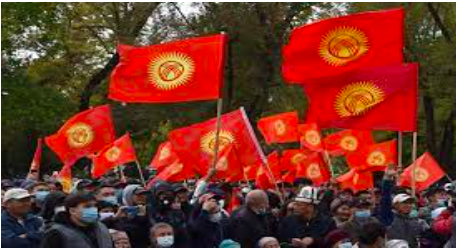On Democratic Peace Theory and its Veracity in Contemporary Times
Posted on : June 14, 2021Author : Raunak Bhattacharya
Democratic Peace Theory happens to be one of the principal theories of the Liberal School of International Relations Theory that emerged following the end of the Cold War. Drawing its epistemic roots from Kantian understandings of peace and relating the same to the ontological reality reflecting the end of the bipolar conflict in the Cold War, leading the unipolar US moment, Democratic Peace theory emerged as a really popular understanding. Bruce Russett has been one of the principal theorists of the Democratic Peace Theory, besides Francis Fukuyama and others. It also happens to constitute an essential element of the US Foreign Policy thereby significantly emphasizing the need to properly understand this theory in its entirety.
Liberalism is one of the most important theoretical schools of thought in International Relations theory. With its epistemological base rooted in the Renaissance, Enlightenment and the Industrial Revolution, and ontological roots in Western Europe, the Liberal philosophical strand happens to be a very important stream of thought. In International Relations, besides Realism, Liberalism happens to play a very vital role in the formulation of Foreign Policy and techniques attesting to Diplomacy.
Before delving deeper into the understanding of Democratic Peace, it is imperative to mark out the basic tenets of Liberal IR theory. Firstly, the Liberal understanding of Human nature is positive. Unlike the Realist School of Thought, that provides a pessimistic understanding of human nature, the Liberals recognize that individuals are ‘self-interested and competitive up to a point’, however, their point of departure with the Realists is that converging self-interests lead to ‘collaborative and cooperative social action, domestically as well as internationally… (i.e.) conflict and war are not inevitable; when people employ their reason they can achieve mutually beneficial cooperation not only within states but across international boundaries’(Jackson & Sørenson, 2018).
Secondly, it is concerned with the idea of Human Progress, something that has attracted a lot of dissonance and debate concerning the nature, degree and the trajectory of the same. Keohane’s belief in ‘the possibility of cumulative progress’ (Keohane, 1989) exists in tandem with the overt liberal optimism following the end of the Cold War, as something that has been expressed as the ‘end of history’ by Francis Fukuyama, following the end of the Cold War, based on an understanding of Hegelian dialectics and Aristotelian telos that the Liberal State shall create the conditions of perpetual peace and prosperity (Fukuyama, 1999).
Besides the aforementioned, the most important aspects of the Liberal School are: Peace, Stability and Order; Ceteris Paribus implying the importance of tolerance as against war, also happens to be a very important aspect. Conflict is something that is of the very last resort for the State to indulge in. The nature of the polity, in this theory, is of great importance pertaining to the maintenance of conditions that shall perpetuate peace. The Democratic Peace thesis is of utmost importance in this case. It is derived its epistemological roots from Immanuel Kant’s ‘Perpetual Peace: A Philosophical Piece’, and Bentham’s concept of international law. As Burchill noted, ‘The laws of nature dictated harmony and cooperation between peoples. War is therefore both unnatural and irrational, an artificial contrivance and not a product of some peculiarity of human nature… A common thread from Rousseau, Kant and Cobden, to Schumpeter and Doyle, is that wars were created by militaristic and undemocratic governments for their own vested interests… War was a cancer on the body politic… an ailment that the human beings themselves had the capacity to cure… with the twin medicines of democracy and free trade’ (Burchill, 2005).
Immanuel Kant provided three definitive articles that shall expedite the process and lead to the teleological realization of ‘Perpetual Peace’: firstly, ‘The Civil Constitution of Every State shall be Republican’; secondly, ‘The Right of Nations shall be based on a Federation of new States’; thirdly, ‘Cosmopolitan Right shall be limited to Conditions of Universal Hospitality’ (Kant, 1991). It is imperative to point out in this instance that Kant in his usage of the term, ‘Republic’, was not at all endorsing democracies, and in fact, he had ‘explicitly dismissed democracy’ (Burchill, 2005; Hobson, 2011). It is also imperative to mention in this regard the nomological setting of Liberalism that has been propounded by John Locke in the form of the Rechtstaat, wherein the State is a Constitutional entity entrusted with the arbitration of the Rule of Law; and, the other is Jeremy Bentham who provided the idea of ‘international law’ and how, the States must adhere by the same in the formulation of their foreign policies (Jackson & Sørenson, 2018).
The phase of triumphalism that heralded the end of the Cold War led to a great resurgence in the celebration of the Democratic Peace thesis, an underlying belief that Democratic polities, by virtue of their individualist politics shall surely be functioning in a manner that shall be constructive in nature, with Ceteris Paribus and modus vivendi being their preferred modus operandi. The underlying ideational base of this thesis has been subjected to vehement criticism and in the long run, it has indeed shown that Democratic Polities do not really adhere to the principles of peace and toleration that they are mostly ascribed and associated with. Acrimony amongst States has persisted on multiple counts and in fact, conflict has not really receded the way, it had been envisaged. The ‘End of History’ did not seem to take place. A jolt to the Democratic Peace has been very distinctly analyzed in the works of Russett, who pointed out the systematic manner in which the conflagration of conflict occurred under the United States of America, the unipolar hegemon since the end of the Cold War, with its hegemony, only recently subjected to challenge by China. It must also be noted that the image that the US portrays as the world’s oldest democracy does stand in stark contrast to the series of clandestine attacks and charges of ‘state sponsored terrorism’ that it had indulged in, for the protection of its ‘borders’ (Russett, 1993).
It is imperative to note in this instance, the structural and normative aspects pertaining to the Democratic Peace Theory, and how the scholars have focused upon the same. While the former particularly focuses upon the institutional aspects in particular, the later looks in depth at the values making up the thesis. Rosato (2003) uses causal logic as an instrument to show the position of Liberal Democratic Polities and how, they have resorted to imperialism as opposed to Ceteris Paribus, and more than once, it is these Liberal Democracies that play the role of the aggressor against a much weaker opponent. The outlying notions of Balance of Power assume much greater importance as opposed to the ideals enshrined by Woodrow Wilson, namely the principle of self-determination. The Structural Realist School, or the Neorealist School of Thought in International Relations theory can be said to be in a much better vantage to sum up these events of conflict, based on situational awareness, as against the theorists of Democratic Peace. Hobson (2011) has used the theoretical structure of the Frankfurt School to draw up a critique of the Democratic Peace Theory in its epistemological fallacies as well as numerous ontological dissonances that this particular theory has been subjected to, especially following the end of the Cold War.
Following the end of the Second World War, the ensuing bipolarity and the recalcitrant nature of the existent World Order that could be witnessed in the form of the Cold War, had been very far away from the fact that Democratic regimes tend to support modus vivendi. Alliance systems and Geoeconomics being in the charge of Geopolitical peace is indeed something that has not been witnessed in every region of the world, especially in South Asia. In fact, free trade is something that benefits the more powerful States, leading to a relationship of dominance and subservience, than of mutual respect and cooperation. Neither does it lead to the creation of a harmony of interests, as can be noted from the existent relationship structure, nor does it promote absolute peace, as the competition still continues, and changes in the morphology of the competition can indeed make the same violent and conflictual.
International cooperation through International and Transnational Organizations has not been particularly successful in this regard as well. The Khartoum Process that involves heavy investment by the European Union to control migratory routes and the nature of migrations along the Horn Africa to Europe, results in more harm than constructive help, as the rates of human trafficking and slavery have not really gone down as it had been expected, and instead in its wake, has replenished human suffering, with more people dying and facing greater red-tape than ever before (Reitano, 2016). It must be noted herein that members of the EU are known precisely for their democratic credentials and in this case, this sense of accountability that happens to be of primary importance in the Liberal understanding of Democracy, as pointed out by Russett, happens to be absent.
In a very similar understanding, it should be noted the United States’ understanding of Collective Security, something that did lead to the First and Second Gulf Wars, with the latter, i.e., the Operation Iraqi Freedom (2003) being of much greater importance, as something could be witnessed in the manner in which the US President, George W. Bush and the Prime Minister of UK, Tony Blair put forward their cases. The large number of soldiers martyred in this particular conflict and the apparent silence of the respective Governments at the failure to discover chemical weapons as Weapons of Mass Destruction (WMD) in Iraq further adds fuel to the fire.
In the contemporary times, it is imperative to mention the 11 days conflict of Israel and Gaza, something that might lead to the Third ‘Intifada’ or uprising. Israel’s treatment of Israeli Arabs and Palestinian Arabs is nothing short of the erstwhile apartheid regime of South Africa. Superior technological strength, combined with ethnographic divisions of the State has resulted in a technocratic apartheid that found itself in shambles with the growth of spheres of influence by the Hamas and the Hezbollah in the Gaza. The non-adherence to the ‘delusion’ of the Two State Solution (O’Malley, 2015), wherein both Palestinians and Israelis have rejected the existence of two States of Israel and Palestine, has led to a reinvigoration of the conflict from time to time. The apparent racism faced by Israeli Arabs is also something that cannot be missed, as it becomes more visible in the coming days. The presence of non-state agents like the Hamas and Hezbollah have further accentuated the crisis, with violence, death, marauding and destruction as being the order of the day. Herein, too, one shall notice the US stance with regards to condoning Israeli attacks against Palestinian civilians and also, supporting urban warfare, with the US President Joseph Biden Jr. and the US Secretary of State, Anthony Blinken making blatant statements upon the same. (BBC, 2021)
From the aforementioned scenarios, it is imperative to come to the conclusion that Democratic Peace Theory is something that does not really stand its ground as a conceptual truth. The requisite restraint and the imprudence that Kant had mentioned in his work, somehow seems to be present only on ink and paper. The reality speaks of something very different, where anarchy and violence seem to be very much in the mix, even at a time when Covid-19 Pandemic caused by the SARS Cov-2 virus is at its peak. It must also be noted how the United States perceives a threat in China, in the multipolar setting of the present world order. Richard Haas’ description of the ‘disarray ‘in the World Order is particularly illuminating and so is Allison’s understanding of the ‘Thucydides’ Trap’ (Haas, 2018; Allison, 2017). The anti-China rhetoric and threatening violence through armed conflict does make the Democratic Peace theory formulation as remarkably obsolete in the present times.
Raunak Bhattacharya
Intern, AGA
Bibliography
Jackson, R., & Sørenson, G. (2018). Introduction to International Relations:Theories and Approaches. New Delhi: Oxford University Press.
Keohane, R. (1989). International Institutions and State Power: Essays in International Relations. Boulder: Westview Press.
Fukuyama, F. (1999). The End of History and the Last Man. New Delhi: Penguin Random House.
Burchill, S. (2005). Liberalism. In S. Burchill, A. Linklater, R. Devetak, J. Donelly, M. Patterson , C. Reus-Smit , & J. True, Theories of International Relations (3rd Edition ed., pp. 55-83). Hampshire: Palgrave Macmillan.
Kant, I. (1991). Perpetual Peace: A Philosophical Sketch. In H. Reiss, & t. H. Nisset, Political Writings. Cambridge: Cambridge University Press.
Hobson, C. (2011, October). Towards a Critical Theory of Democratic Peace. Review of International Studies, 37(4), 1903-1922.
Rosato, S. (2003, November). The Flawed Logic of Democratic Theory. The American Political Science Review, 97(4), 585-602.
Reitano, T. (2016, November). The Khartoum Process: A sustainable response to human smuggling and trafficking? Retrieved May 26, 2021, from The Khartoum Process: A sustainable response to human smuggling and trafficking?: https://issafrica.s3.amazonaws.com/site/uploads/policybrief93.pdf
O’Malley, P. (2015). The Two-State Delusion: Israel and Palestine- A Tale of Two Narratives. New York: Penguin Viking.
BBC. (2021, May 25). Israel-Gaza conflict: Blinken promises US support for Gaza reconstruction. Retrieved from British Broadcasting Corporation: https://www.bbc.com/news/world-middle-east-57238451
Haas, R. (2018). A World in Disarray: American Foreign Policy and the Crisis of the Old Order. New York: Penguin Viking Press.
Allison, G. (2017). Destined for War: Can America and China escape the Thucydides’ Trap? New York: Houghton Mifflin Harcourt.




